|

Defunct Roller Coasters
Page One
These are recreations of coasters that have
been either destroyed or are no longer operating. Since we can't ride them in the real world
I wanted to keep these classic designs alive virtually so go for a ride.
These coaster files are zipped up to
conserve space and some of them have scenery objects that need to be saved in the right directories on your computer
for the full experience.
If you ever have any problems please
email me.
The Russells Point Coaster
1924 to 1975
Standing But Not Operating 1975 to 1981
Designed by National Amusement Devices
Russells Point was one of the many lakeside amusement parks that existed in
Central Ohio from the 1920's on. The Coaster had as many names as the park it
sat in. It was the Silver Streak from 1967 to 1975 when the park was known as
Indian Lake Playland. Earlier the ride was called Thriller while the park was
called Sandy Beach Park but it was also just known as Coaster. It was supposedly
moved to Russells Point from another amusement park but I haven't found any
information as to where that was. The design is a peppy out and back that at the
end of its life wasn't so peppy due to rot and lack of maintenance. After
sitting dormant for years it was sent around the track three more times in 1981
for old times sake before being torn down to be replaced by condos.
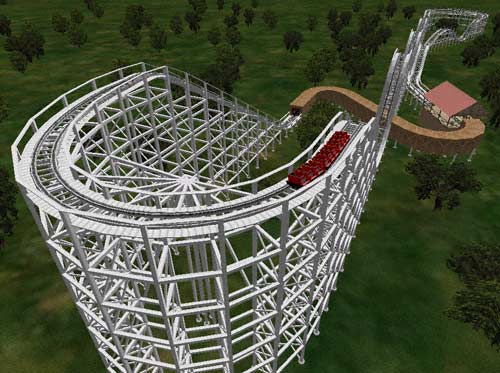
The Riverview
Park Coaster
1920 to 1978
Designed by John Miller & Harry Baker
The Coaster (originally called the Airplane) ran at Des Moines, IA's Riverview
Park for fifty-eight years. It was just sixty-eight feet tall but was still
packed with airtime-a-plenty. With the arrival of Adventureland in Des Moines
Riverview sold out to Adventureland in the hopes that the park would be used for
corporate picnics but Adventureland chose to shutter Riverview and eventually
bulldoze the Coaster.
A special thanks to Riverview Park's Bill Kooker for a lot of information about
the coaster as well as photos.
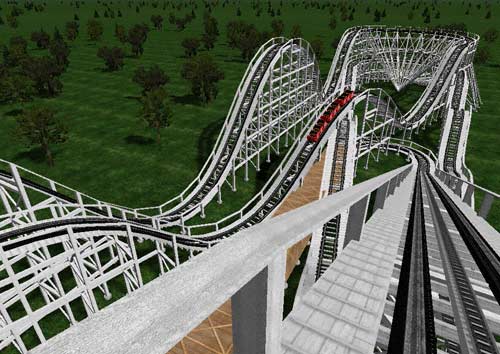
The Central Park Cyclone -
Skyclone
1929 To 1957
Designed By Unknown
Central Park was the other park in Allentown, PA along with Dorney Park. It
opened in 1893 and closed in 1957. The Cyclone (later Skyclone) was added in
1929 and while I have yet to discover who designed it my gut feeling is John
Miller. During the Cyclone's life it was rebuilt several times to make it safer
(supposedly the public thought that it was extremely unsafe) and also burned to
the ground in 1935 before being rebuilt. This triangular shaped out and back
coaster was built over a ravine it has a few good drops and plenty of airtime.
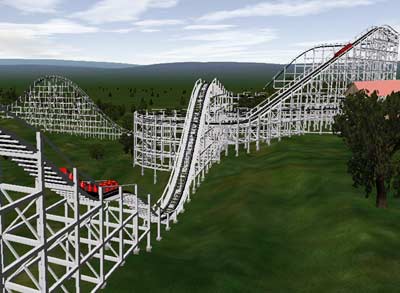
The Riverview Park Big
Dipper / Zephyr / Comet
1920 to 1967
Designed By John Miller
Chicago's Riverview Park
was big on renaming its coasters especially after accidents. This John Miller
"Deep Dipper" style out and back coaster started its life as the Big Dipper
before changing names and getting covered trains (to keep riders from standing
up) after a couple of deaths. The Big Dipper was nestled between the Chicago
River and Riverview's Picnic Grove and provided thrills until the park was torn
down after the 1967 season. The area that once was Riverview is now a strip
mall, DeVry Campus and UPS shipping center.
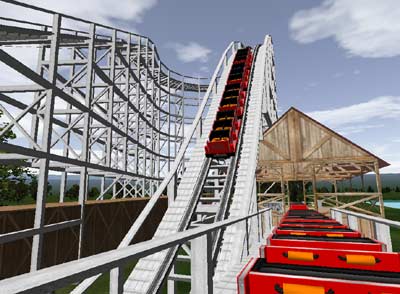
The Cedar Point Cyclone
1929 to 1951
Designed by Frederick Church
Built by Harry Traver
The golden age of Cedar Point really began when the Cyclone was added in 1929.
This beach side twister was designed by Frederick Church but built by another
legendary coaster designer Harry Traver. The Cedar Point Cyclone was a fast and
furious wooden coaster that enthusiasts still lament more than half a century
after it was demolished to start the parks transformation from a run down park
into today's mega-amusement park.
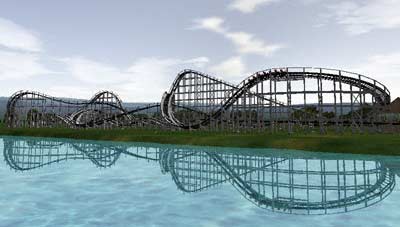
The Bridgeport
Pleasure Beach Park Sky Rocket
Designed By John Miller & Harry Baker
1921 to 1951
Standing But Not Operating 1952 to 1961
Pleasure Beach still exists in Bridgeport, Connecticut but sadly all that
remains are a few buildings from the park and maybe a footer or two from the Sky
Rocket. The Sky Rocket was designed by John Miller & Harry Baker during their
brief partnership and is a fun little coaster with some good thrills. The
remains of the Sky Rocket were auctioned off in 1961.
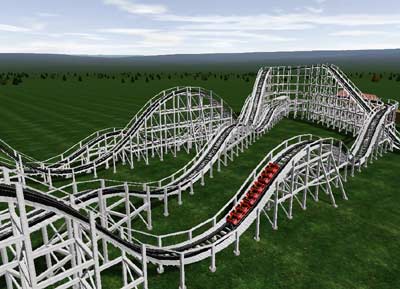
The Rocky Springs Park
Wildcat
Designed By Herbert Schmeck
1928 to 1965
Standing But Not Operating
1966 to 1970
1970 to 1981
Standing But Not Operating
1982 to 1990
Lancaster Pennsylvania’s
Rocky Springs Park was the home to one of Herbert Schmeck's Wildcats. This one
had a figure eight layout that was packed with speed and negative g forces. The
park opened and closed several times and now is the site of a Bed & Breakfast
but sadly all that remains of the park is its carousel and memories of rides
like the Wildcat.
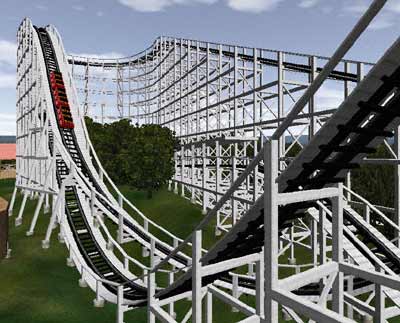
The Joyland Roller Coaster
1949 to 2003
Standing But Not Operating 2004 to Present
Designed By Herbert Schmeck
The Roller Coaster at Witchita, Kansas' Joyland Park was built for just $75,000
back in 1949. It's an air filled out and back coaster with plenty of thrills.
Unfortunately Joyland has been on a roller coaster ride the past few years with
it's fate looking bleaker every day. If the park can't be saved hopefully the
Roller Coaster can.
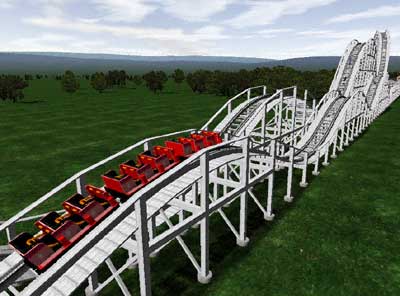
The Glen Echo Park Coaster Dips
1921 to 1967
Designed by Frank Moore
The Coaster dips thrilled people at Washington D.C.'s Glen
Echo Park from 1921 until the amusement park closed in 1967. It's an
interesting coaster that really used it's terrain to its advantage. Glen Echo
Park is still around today as a National Park but all that remains is the
carousel, a few buildings and memories of the Coaster Dips.
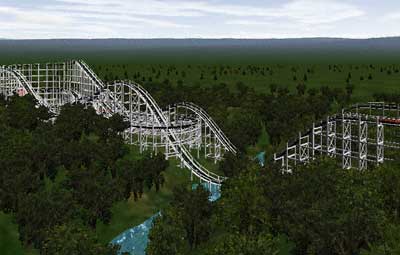
The Kappapia Park
Loop Coaster
1980 to 2003
Designed By Meisho Amusement Machines
I stumbled on this park while looking through a Japanese site about defunct
amusement parks. Kappapia Park which is located in Takasaki, Japan closed down
in either 2003 or 2004 ending the life of this coaster.
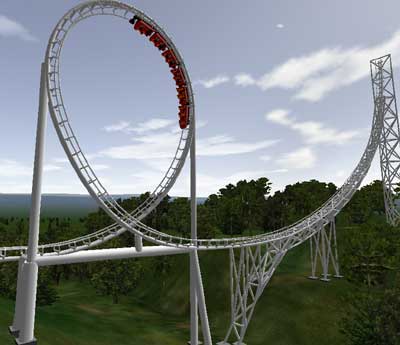
The Walled
Lake Park Flying Dragon
1929 to 1968
Designed By John Miller
In 1928 coaster builder Fred W. Pierce came to Walled Lake which is near
Detroit, Michigan in order to build his own park. John Miller was hired to
design the centerpiece for Walled Lake Park which was named the Flying Dragon.
After Fred W. Pierce's death in the early 1960's his family sold the park to the
owners of the nearby Edgewater Park. Eventually with competition from the nearby
Boblo Island Park, aging rides and property values increasing Walled Lake Park
and the Flying Dragon closed in 1968.
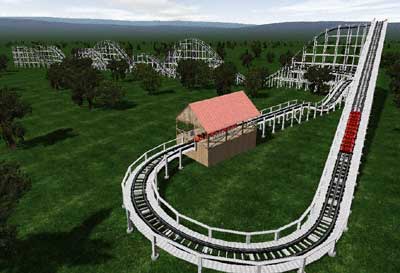
The Muskego Beach Cyclone - DandiLion Park Tailspin
The Cyclone 1929 to 1967
Tailspin 1967 to 1977
Standing But Not Operating 1978 to 1983
Designed By Charles Rose
The Cyclone opened at Muskego Beach amusement park in 1929. In
my research I found some sources that claimed that it was designed by John
Miller while others most notably a newspaper article about the park said that
Charles Rose was the actual designer. Also at issue was the length of the ride
where some sources put it at 4,200 feet long after studying the photos and
building it came out to 2,200 feet long as was noted in the newspaper article.
Muskego Beach was located on the shores of Lake Muskego in Muskego, Wisconsin.
Ownership of the park changed hands several times and the parks name was
eventually changed from Muskego Beach to DandiLion Park and the Cyclone became
the Tailspin. In 1978 due to competition from nearby Marriott's Great America
the owners of DandiLion Park decided to close the parks doors forever and a few
years later the Tailspin was torn down and sold for scrap.
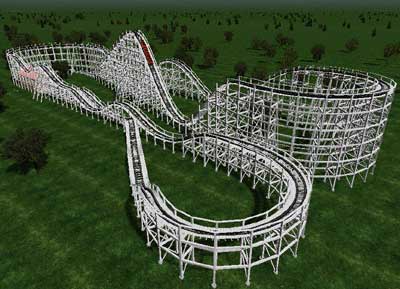
The Old Orchard
Beach Jack Rabbit
1917 to 1946
Designed By Unknown
I have not been able to find much about the Old Orchard Beach Jack Rabbit other
than a few old photographs and its date of operation. My gut feeling is that
this is a John Miller design but I have not found any information to back up
this claim. If anything the Jack Rabbit was a great little coaster down by the
seaside that thrilled people of Maine for decades.
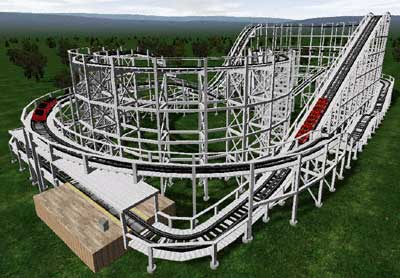
The Oaks Park Zip
1924 To 1934
Designed By Harry Traver
The Zip was all but
forgotten until a few photos of it were unearthed back in the 1970's and drew
gasps when roller coaster enthusiasts saw it. This coaster is a direct
predecessor to Harry Traver's legendary triplets (the Crystal Beach Cyclone,
Palisades Cyclone and the Revere Beach Lightning) with its twisted layout,
extreme banking, trick track and tilted helix.
The Zip was built over a
part of the Wilmette River and was known for being a "rib tickler" meaning that
your ribs got bashed around. Due to injuries, excessive maintenance costs as
well as the Great Depression the Zip only lasted ten years before having it's
steel structure torn down and sold to Japan for scrap metal.
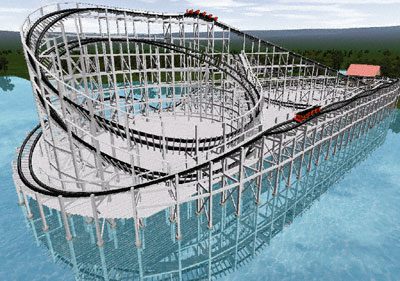
The Coney Island Tornado
1926 to 1977
Designed by Fred Church
The Tornado (also known as The Bobs) was
one of Coney Island's three legendary natural disasters; the others were the
Cyclone and Thunderbolt. Unfortunately the Tornado and Thunderbolt are gone but
the Cyclone is still with us. Built in 1926 by Fred Church at a cost of
$250,000 the Tornado was built over several shops and other concessions
including a dark ride so the track doesn't drop all the way to the ground but
wound around above several buildings. The Tornado has some great twisted track
including a rooftop hugging finale helix1.
As Coney Island went from being New York
City's play land to a deteriorated shell of itself in the seventies arsonists
struck the Tornado in 1977. After a couple of fires the owners still wanted to
rebuild the coaster but a third fire destroyed so much of it the entire coaster
soon met the wrecking ball.
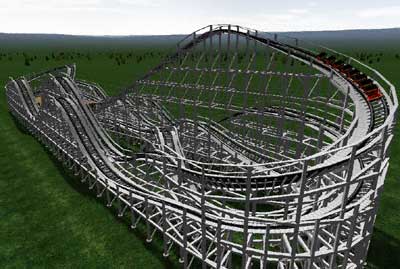
The
LeSourdsville Lake Park Screechin' Eagle
The Cyclone at Moxahala Amusement Park 1927 to 1938
Moved to LeSourdsville Lake Park 1939
The Cyclone 1939 to 1961
The Space Rocket 1961 to 1977
The Screechin' Eagle 1977 to 2002
Standing But Not Operating 2003 to Present
Designed By John Miller
This coaster has had three different names and existed at two different parks.
This out and back coaster was designed and built by John Miller for the Moxahala
Amusement Park in Zanesville, Ohio. After that park closed the coaster was
dismantled and moved to LeSourdsville Lake Park in Middletown, Ohio where it
remained named the Cyclone until 1961. At some point the ride was re-profiled
with the removal of a hill so I have created the Cyclone as it was originally
built and the Screechin' Eagle with the re-profile as it exists today. In
addition to the changes to the track the Cyclone ran two bench cars while the
Screechin' Eagle used three bench cars.
Unfortunately this coaster sat dormant for the 2000 and 2001 season while the
park ownership changed hands and the new owner searched for someone to run the
park. LeSourdsville Lake Park opened back up in 2002 but unfortunately has sat
dormant ever since. With each passing year sadly it becomes less likely that the
Screechin' Eagle will fly again.
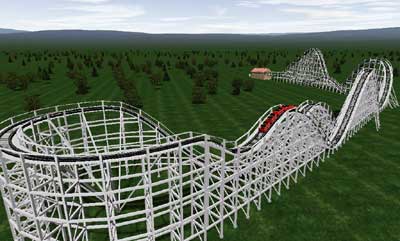
The Santa
Monica Pier Whirlwind Dipper
1924 To 1930
Designed By Frank Pryor and Fred Church
The Whirlwind Dipper was built to replace the Blue Streak Racer with something
more thrilling in order to compete with rides on the nearby Venice Pier. It was
built for $75,000 and has plenty of diving turns and airtime hills squeezed into
its compact layout. The Whirlwind Dipper was one of the many coasters who were
lost due to the great depression. It was torn down in October 1930.
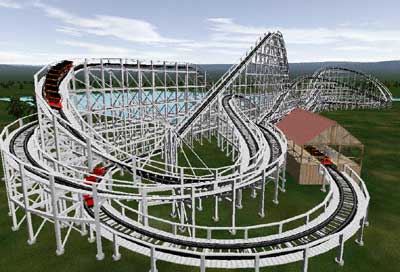
The Kennywood Pippin
1924 to 1967
Designed By John Miller
The Pippin was built by master coaster designer John Miller around one of
Kennywood Park's ravines that he used for a stunning affect especially since it
has several large drops even before you get to the lift which is half the way
through the ride. Kennywood Park's Pippin isn't completely defunct as it's drops
into the ravine and far turnaround are still part of the Thunderbolt.
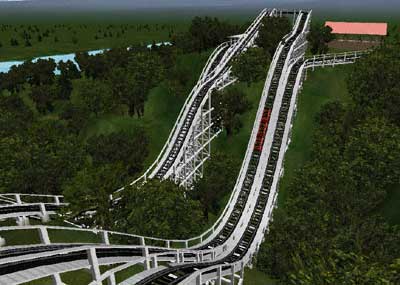
The Eldridge Park Speedway
1937 to 1983
Designed by Oscar Bitler
Eldridge Park was a small amusement park in Elmira, New York and the Speedway
was its main attraction. Topping out at fifty-three feet you wouldn't normally
expect many thrills but the Speedway gives some good air and a few sudden
changes of motion. It was designed by Oscar Bitler who after building several
coasters for master coaster designer John Miller broke away to design just two
coasters; the quirky Williams Grove Cyclone in 1933 and the Speedway in 1937.
Eldridge Park finally closed its doors in 1983 and sometime after that the
Speedway was demolished.
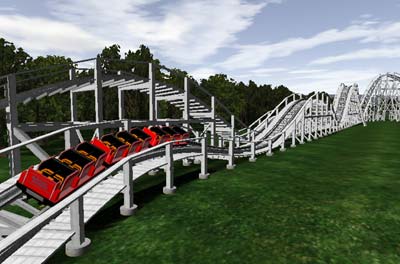
The Coney Island (Havana,
Cuba) Montana Rusa
Designed By Herbert
Schmeck
1951 to ?
Standing But Not Operating
? to ?
The Montana Rusa that ran
at Havana Cuba's Coney Island Amusement Park was a tough coaster for American
coaster enthusiasts to add to their list especially after Castro took control of
Cuba in 1959. I have no idea when this coaster stopped operating but there are
photos of it on the internet of it standing but not operating. It may still be
there slowly rotting or it may have been taken down.
Looking at the Montana
Rusa it's obviously a smaller sibling of the Playland Rocket/Knoebels Phoenix
with a similar layout. Basically the Montana Rusa has a figure eight layout
with several airtime filled runs just like it's older and bigger sibling and
would be a really great design for a growing park to add.
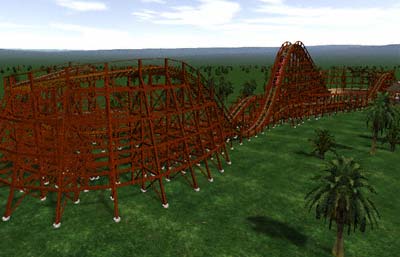
The Riverview Beach Wildcat
1927 to 1964
Designed by Herbert Schmeck
This is actually a bit of a mystery coaster. While
looking for pictures of the Hummingbird Coaster that once existed at the
Riverview Beach Amusement Park that stood in Pennsville, NJ I came upon a photo
showing a second wooden coaster at the park. It took a few hours of digging but
I later found out that the coaster was named the Wildcat. No designer was
listed but it had several characteristics of a Herbert Schmeck design with its
swooping first drop and the fact that "Wildcat" was the generic name that
Schmeck gave his designs with that first drop. What makes this a mystery
coaster is the fact that it does not show up on the list of all of the coasters
made by the Philadelphia Toboggan Coasters and couldn’t be a freelance job
because Schmeck only worked for them. So if this is a Schmeck, PTC built 146
coasters rather than the 145 that they are credited for.
If anything the Wildcat is a fun out and back coaster with
some of Schmeck's flair added to it. The one photo that I found of this coaster
didn't show the far turnaround so I looked to Schmeck's other Wildcat's for
inspiration. This Wildcat certainly had claws and could bite so take it for a
spin.
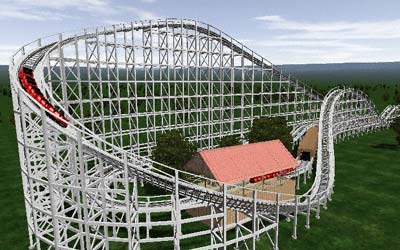
The Knott's Berry Farm
Model Coaster
While going through and
redoing several of my older pages on Negative-G to bring them up to spec I came
upon a picture of a model coaster that once sat at Knott's Berry Farm under
their now defunct Windjammer rollercoaster. It was part of one of those remote
control coin operated boat attractions and if you steered your boat into a spot
right next to this coaster the coaster would launch and go through its course.
At the time I know several people stated that you could never build a loop like
this has because the forces would be too high. Well after building it I can now
say that they were wrong so go and give this neat little shuttle loop coaster a
try.
I know technically this is
not a real coaster in the sense that it was built for people to ride but I
believe it has been removed from the park so this is probably the best place to
put it.
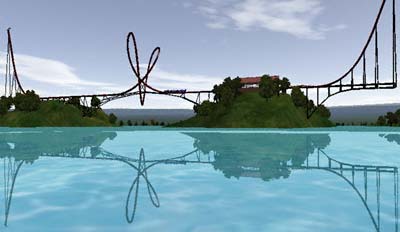
The White City Zip
1928 to 1961
Designed By Herbert Schmeck
The Zip was an interesting little coaster that thrilled visitors to White City
in Worchester, Massachusetts from 1928 to 1961. The Zip is kind of an out and
back coaster mixed in with a twister and a terrain coaster. It has several
spiraling drops along with a completely insane ending to please you lateral
force lovers.
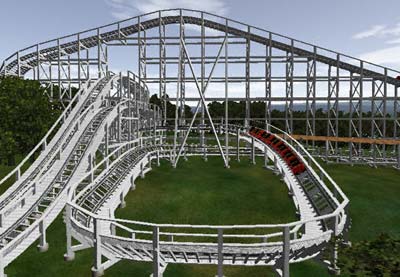
Fugi-Q Highland's Moonsault Scrabble
1983 to 2000
Designed by Meshio/Vekoma
The Moonsault Scramble was built in 1983 in the shadow of Japan's Mount Fuji at
Fuji-Q Highlands. It was designed by Vekoma of the Netherlands for their
Japanese distributor Meisho. Moonsault Scramble was built in the middle of the
park's ice skating rink/go-kart track and was known for it's extremely high G
forces. This shuttle coaster is similar to Vekoma's popular Boomerang coasters
with its slow lift backwards out of the station before being released down
through the station onto the loops. Instead of the typical boomerang layout
Moonsault Scramble inverts four times as the train passed trough it's one of a
kind pretzel loop.
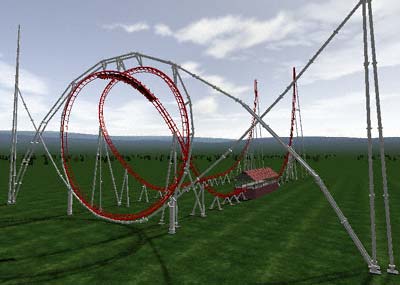
The Lincoln Park Comet
1946 to 1987
1988 to Present Standing But Not Operating
Designed By Vernon Keenan and Edward Leis
The Comet thrilled patrons
to Lincoln Park in North Dartmouth, Massachusetts from 1946 until the parks
closure in 1987. It was designed by Vernon Keenan and Edward Leis from National
Amusement Devices and is a fun figure eight coaster with plenty of crossovers
and airtime.
While the Comet is
currently standing but not operating Little A-Merek-A a small amusement park in
Wisconsin has purchased the Comet's trains and has it in their long term plans
to rebuild the Comet so that it can give thrills once again. Until then give it
a ride virtually.
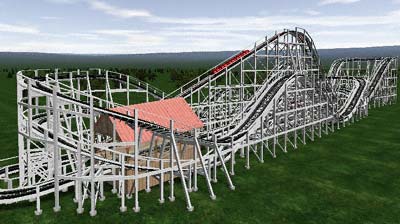
The
Marriott's Great
America Tidal Wave
1977 to 1991 Illinois
1977 to 2002 California
Designed By Anton
Schwarzkopf
While these two identical
coasters are not both defunct, many of us who grew up riding them at the two
Marriott's Great America parks sadly miss them. These are the standard
counter-weight driven "Shuttle Loop" coasters that graced both parks. The
California version was re-themed to the 1950's and given Greezed Lightnin’ as a
name for a year before being removed from the park and sold to Six Flags where
it sits in storage hopefully for future use. The Illinois version sat idle for
a few years before being moved to Six Flags Over Georgia as the Viper where it
ran until 2001. In 2003 it opened as Greezed Lightnin’ at Six Flags Kentucky
Kingdom where it continues to thrill new riders and old riders like me today.
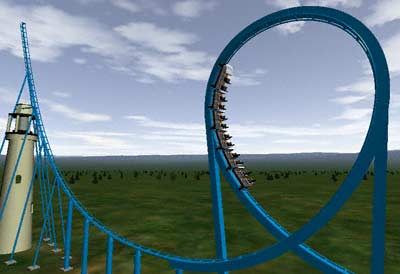
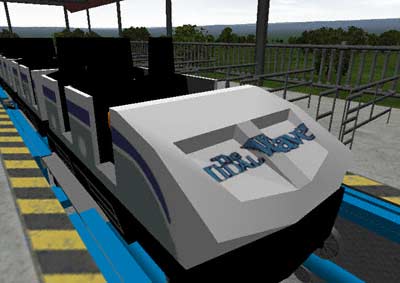
The Kings Island Demon
1977 to 1987
Camden Park Thunderbolt Express
1988 to 1999
2000 to 2004 Standing But Not Operating
Designed By Arrow Dynamics
The Demon was the first Arrow Dynamics "Launched Loop"
coaster to debut to the public. It opened in 1977 at Kings Island near where
the Drop Zone ride sits today. After leaving Kings Island in 1987 it opened up
at Camden Park where it ran until 1999 before breaking down and sitting idle
until today.
In contrast to the other
shuttle loops of the 1970's you have to climb five stories high to get to the
station which ended up being a detraction to many riders. Once in the
train you get pushed until the tracks drop off of the tower, through a loop at
the bottom and then back up a similar tower where it is all repeated in reverse.
In order to get this to work you will need to have No Limits
Version 1.5 installed. I had to tweak the ride
in order for it to work so at the far end your restraints will open and close
before sending you in reverse back to the station so don't get out of the train
because it's a long fall.
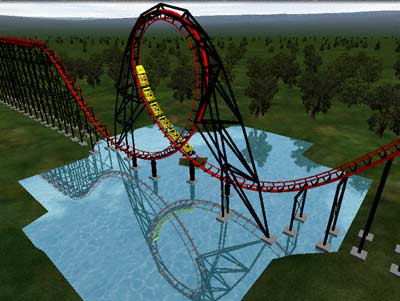
The Miracle Strip Starliner
1963 to 2004
Designed By John Allen
The Starliner was the star attraction at Panama Beach's Miracle Strip Amusement
Park. It was designed by the Philadelphia Toboggan Company's chief and final
coaster designer John Allen. It's a nice out and back coaster with plenty of
airtime and probably one of the best placed tunnels ever on a coaster.
Unfortunately in 2004 the land that Miracle Strip sat on became more valuable
than a classic amusement park so the owners decided to sell it to developers to
turn it into a shopping area. Lost was Florida's oldest wooden coaster as well
as a rare treat, a seaside amusement park.
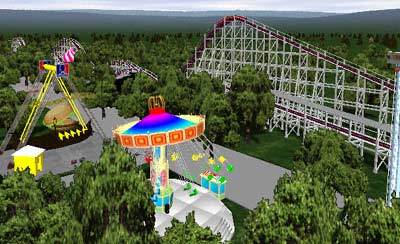
The Cyclone
Philadelphia Sesquicentennial Exposition 1926
Chicago Century Of Progress 1933 to 1934
Designed By Harry Traver
The Cyclone that Harry Traver brought to the Philadelphia
Sesquicentennial Exposition in 1926 and seven years later to the Chicago Century
of Progress was one twisted creation. The structure was made of steel and might
have been the first coaster to do so. It was built to be able to be
disassembled and transported to another site. It was the thrill of the midway
in Philadelphia and Chicago but not much is known what happened to it between
and after its short stints. Chances are it sat in storage from 1926 and 1933
and was rumored was sold to a park in Indiana after 1934 but that has not been
confirmed.
To be able to fully experience the Cyclone please go and
Download the Coaster Sims Park Pack 1 that features some
of the additional 3d objects such as pathways and other park rides that I have
added to the Cyclone to make the experience that much more realistic. Also
rather than zipping up the track I used the No Limits Track
Packager that will extract all of the files not in the Park Pack including
the track onto the right directories on your No Limits directory.
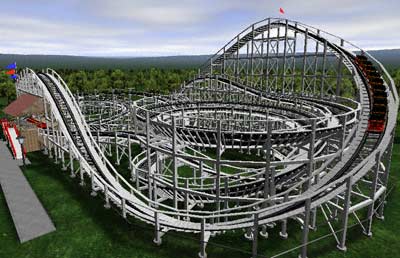
The Rye Playland
Airplane Coaster
1928 to 1957
Designed By Fred Church
The legendary Rye Playland Airplane Coaster is one of those coasters that die
hard enthusiasts would give up an arm and a lung to go back in time to ride due
to it's insane intensity and twisted layout. Built for $200,000 in 1928 the
Airplane thrilled Rye Playland's guests until 1957 when it became cheaper to
demolish the ride rather than renovate it.
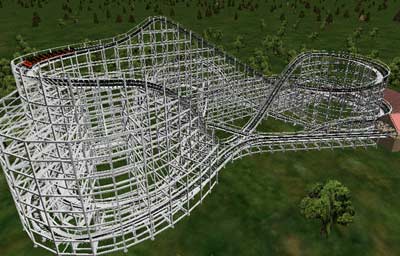
Aconcagua at
Parque de la Ciudad
1982 to 2003
2003 to ? Standing But Not Operating
Designed By Anton Schwarzkopf
Aconcagua is one of the last of the Schwarzkopf "Speed Racers". It was built in
1983 at Parque de la Ciudad in Buenos Aries, Argentina. The park has been the
center of many scandals due to the fact that it's owned by the government. The
park closed in 2003 due to poor maintenance and is supposed to open in 2004 but
it's not sure when and if it will reopen. Just a side note Parque de la Ciudad
built a racing coaster in the 1980's that was never completed so you can see
that the parks financial management isn't the greatest.
Aconcagua is the name of a mountain in Argentina. The coaster is a similar
design to Nessie at Hansa Park in Germany but does not have Nessie's loop.
Instead Aconcagua has a flat stretch of track that lets you enjoy the speed.
There are some great moments of airtime on Aconcagua would be a fun coaster
that's thrilling enough but not too intense that the whole family can ride.
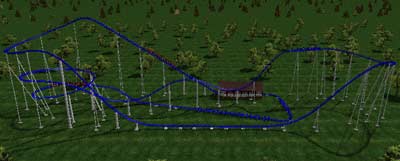
The Scenic
Coaster At Lenape Park
1926 to 1980
Designed By Herbert Schmeck
***7-20-04 I updated this
a little bit after receiving some more information about the coaster from some
fellow enthusiasts***
I found out about this
coaster while looking at auctions on Ebay. The photo that I saw was of a park
called Main Line Park in West Chester Pennsylvania. I looked for information
about the park and coaster on line but found none. Then I discovered that Main
Line Park was originally called Lenape Park and from there I found one more
picture of it as well as information about the coaster in an appendix in "The
Incredible Scream Machine" By Dr. Robert Cartmell.
What I found out was that this coaster ran from 1926 through 1980 and was
designed by the Philadelphia Toboggan Company and their chief designer Herbert
Schmeck. It's an interesting little out and back coaster with a horse shoe
shape. From photos it looks more like a family coaster but it has a few thrills.
Lenape Park is still open. It is now known as Brandywine Picnic Park. It is a
private picnic park with a few rides but no coasters.
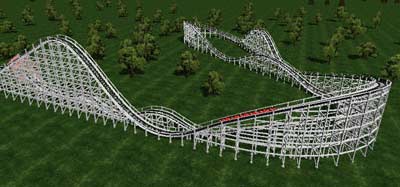
Loop The Loop
1910 to ?
Designed By ?
Loop
The Loop coasters were the sensation for an extremely short period of coaster
history. What made them such a sensation was the fact that they turned people
upside down. Many parks installed Loop The Loops including Columbus Ohio's
Olentangy Park which this one is recreated from a postcard of but most of them
were not long lived due to low rider capacity as well as many people willing to
watch but not ride.
Several of the early looping coasters had extreme g forces in the loops that
caused neck injuries. This problem was solved by Edwin Prescott who used an
ellipse rather than a circle for his loop. After the early flirtation with
looping coasters they disappeared from the scene until the 1970's when
technology was able to create a safe, comfortable and profitable coasters.
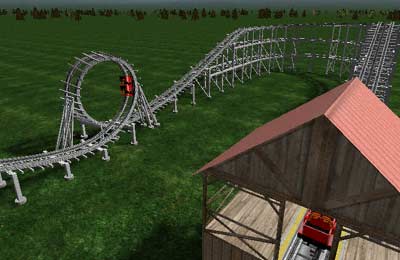
The Crescent Park Zephyr
1928 to 1961
Designed By Harry Baker
I have not been able
to find out that much about this coaster except for about four pictures on the
web. Crescent Park was a small amusement park in Riverside Rhode Island. The
coaster was damaged by a hurricane in 1934 but was rebuilt with some
modifications. It's a compact thriller that gives plenty of thrills for not
being that tall.
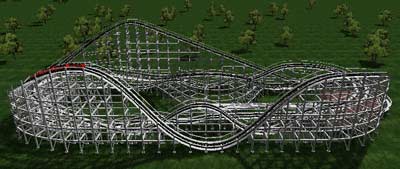
The Bertrand Island Wildcat
1925 to 1983
Designed By Fred Church
The Bertrand Island
Wildcat Was a "Z" shaped out and back wooden coaster that thrilled the Garden State for
fifty-eight years. It stood eighty feet tall and the Wildcat has plenty of air,
nice twists and turns along with a couple of double downs. Sadly Bertrand
Island closed in the early 1980’s and shortly after this classic was torn
down.
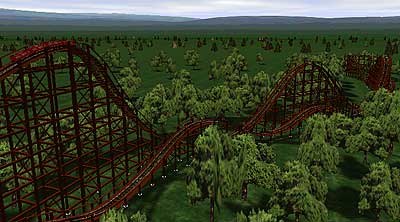
The Riverview Park Pippin/Silver
Flash/Flash
1921 to 1967
Designed By John Miller & Harry Baker
Chicago's famous Riverview Amusement Park was notorious for
changing their coasters names and the Pippin ended up with three. It was known
as the Pippin from 1921 - 1937, from 1936 to 1960 it was the Silver Flash and
from 1961 to the parks closing its name was shortened to the Flash.
This Miller & Baker out and back coaster was known for its fantastic airtime and
it's covered trains. Riverview was always extremely safety conscious and after a
death on the ride in 1937 to keep people from standing up and to give it some
streamlined theming and covered trains with a top that looked reminiscent of the
Burlington Zephyr railroad trains of the era.
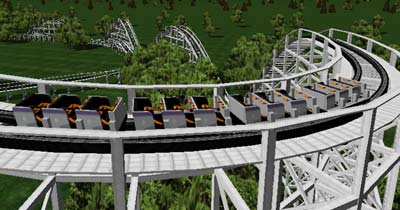
PNE/Hastings Park
Giant Dipper
1925 to 1947
Designed By Fred Church
This twisted little coaster once thrilled Hastings Park that is now known as the
Pacific National Exposition (PNE) in Vancouver. It was designed by Fred Church
and lasted twenty-seven years at the park before being torn down to build a
racetrack at the park. Part of this coaster still lives on today as its trains
run on the Puyallup Fair Coaster just across the boarder in Washington State.
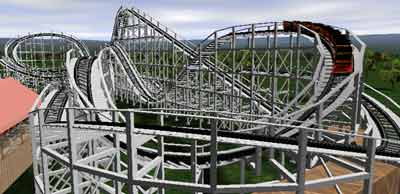
The
Lakeside Park Wildcat
1930 to 1967
Designed By Herbert Schmeck
I've had a tough time
finding anything out about this coaster and Lakeside Park which once was in
Dayton Ohio. After extensive searching on the web I finally found that the park
closed in 1969 with what was remaining of the park in 1994 to make way for US
34. Lakeside Park was also home to the first "Flying Turns" bobsled coaster by
Norman Bartlett. I have only found two photos of the Wildcat. One of them was
a fantastic aerial shot along with the coaster's layout in Scott Rutherford's
book "Roller Coasters" which enabled me to be able to recreate this wicked
coaster.
The Wildcat was built by
Philadelphia Toboggan Coaster's Herbert Schmeck in 1930. This twisted creation
thrilled it's riders with an extremely twisted airtime filled compact layout.
According to "The Incredible Scream Machine" by Robert Cartmell people used to
congregate around the Wildcat after dark to watch sparks fly from the coaster
cars as they sped around the Wildcat's turns.
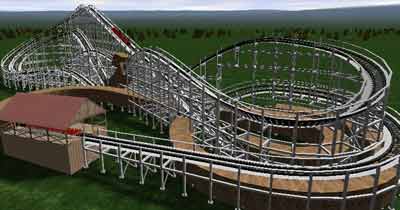
The
Riverview Park Jetstream
1964 to 1967
Designed By John Allen
The Jetstream was the last
coaster built at Chicago's famous Riverview Park. It was built to replace
Riverview's aging Greyhound coaster after it was deemed that it’d be cheaper to
build a new coaster rather than refurbish the Greyhound. If the Jetstream was
built at any other park it would have been a huge success but surrounded by six
other wooden coasters and one of the greatest coasters of all time, the Bobs it
had a hard time stand out.
Designed by John Allen of
Philadelphia Toboggan Coasters the Jetstream cost just $303,756.77 but due to
the parks untimely closing its investment was never paid back. It’s a fun
little coaster, go give it a ride.
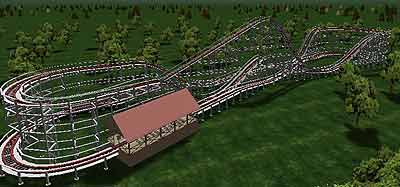
The Clementon Lake Park
Jack Rabbit
1919 to 2003
Designed By John Miller
The Jack Rabbit thrilled families in New Jersey's Clementon Lake Park for 84
years. It's basically a family style coaster with a few thrills. For most of its
existence the Jack Rabbit did not have up-stop wheels so it limited the thrills
that this classic could give.
After several years of problems with this coaster and its low thrill factor the
park decided to remove this coaster and replace it with a modern thriller to
open in 2004. While I'm glad that there will be a new coaster it's sad that
there will be one less John Miller coaster in the world.
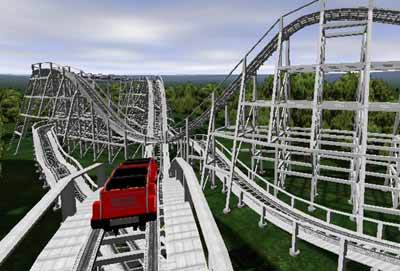
The
Excelsior Park Cyclone
1925 to 1973
Designed By Fred W. Pearce
This quick and zippy little "L" shaped out and back coaster thrilled people in
the Minneapolis, Minnesota area for over forty-eight years until it's
destruction in 1973. I have not seen that much information about this coaster
outside of a few pictures of it online. There are incorrect rumors of it being
relocated to Valley Fair Park as the High Roller but that coaster has a
completely different layout than the Cyclone. Oh, you might want to
duck during the second half of the helix as head room gets a little tight.
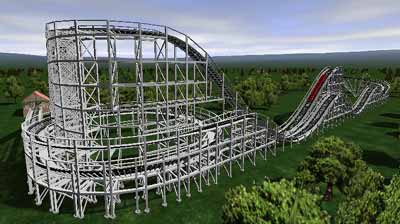
Click here
for more No Limits Rollercoaster downloads.
-G Home
-G Forums
All pictures on this site have
been taken by me or my wife Carrie. Please do not use without
permission but ask and chances are I'll give it to you.
Copyright 1999 - 2025
Paul B. Drabek
|










































